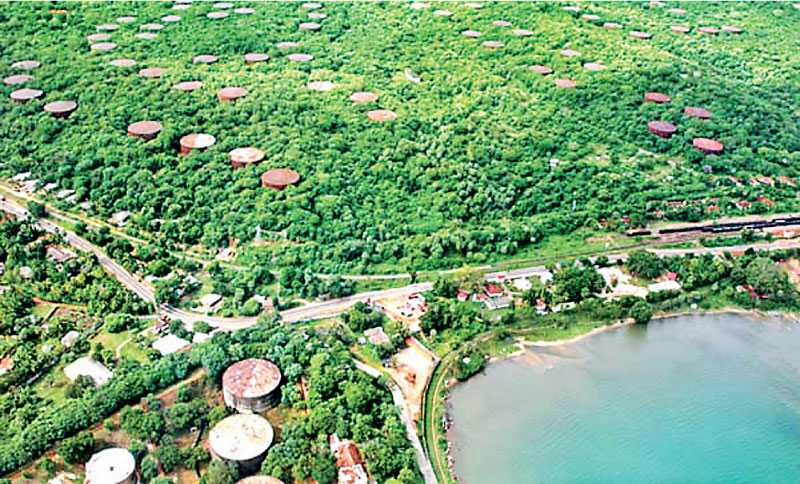Tuesday Feb 24, 2026
Tuesday Feb 24, 2026
Thursday, 18 February 2021 03:38 - - {{hitsCtrl.values.hits}}

Trinco tank farm to be developed in a JV between Lanka IOC and CPC
By Uditha Jayasinghe
The Government yesterday said talks with India on development of the Upper Oil Tank Farm in Trincomalee had concluded with both sides agreeing to manage them via a partnership between Lanka IOC and Ceylon Petroleum Corporation (CPC), with the latter being the majority shareholder.
Energy Minister Udaya Gammanpila speaking at an event at the CPC’s Kolonnawa storage terminal, praised India for being flexible on the stipulations put forward by the Sri Lankan Government and agreeing to a joint venture that would see Sri Lanka regaining the tanks that were given to Lanka IOC nearly two decades ago.
The talks on the oil tanks, which closely followed Sri Lanka’s controversial decision on the East Container Terminal (ECT), were held with Indian High Commissioner Gopal Baglay. Minister Gammanpila said Baglay’s stance was praiseworthy, as India was willing to venture beyond the terms outlined in an agreement with the former Government in 2017.
“The talks concluded last Sunday and they were to Sri Lanka’s advantage. We will soon re-acquire the Trincomalee oil tanks and they will be managed and developed under a company jointly held by the CPC and Lanka IOC. The CPC will be the majority shareholder. We will work very cordially with Lanka IOC on this venture,” Gammanpila told the gathering.
“We are very grateful to the Indian High Commissioner for understanding our perspective and agreeing to our provisions put forward after discussions with trade unions and CPC upper management.”
Gammanpila also acknowledged that Indian support was crucial for the project as the majority of ships passing the tank farm were Indian. The Minister was also optimistic of the oil tanks being used to earn much needed foreign exchange for the country for the first time since World War II. He also said work had already started on nine other tanks capable of holding 10,000 MT of oil and other petroleum products, as part of Government efforts to promote Sri Lanka as an energy hub in Asia.
The Indian High Commission spokesperson, responding to media queries on joint development of the Upper Oil Tank Farms in Trincomalee, noted: “India and Sri Lanka have identified energy partnership as one of the priority dimensions of their cooperation. India is committed to working together with Sri Lanka for the island’s energy security.
“In this context, consultation and discussions have been undertaken to promote mutually beneficial cooperation for development and operation of the Upper Oil Tank Farms in Trincomalee. We look forward to continuing our productive engagement with Sri Lanka in this regard.”
In 2003, Lanka IOC – a subsidiary of Indian State-owned IOC – bought a one-third share in Ceylon Petroleum Storage Terminals Ltd., which operates the China Bay tank farm. The CPC entered into a MoU with Lanka IOC to grant a long-term lease to the Indian firm for operating 32 of the 99 storage tanks at Trincomalee for 35 years, for an annual fee of $ 100,000.
However, the 35-year lease finalisation dragged on for years, and trade unions and different factions of society questioned Government plans for the 99 storage tanks, each with a capacity of 12,100 tons.
During the previous regime, Cabinet approved a proposal to have complete land ownership under Sri Lanka but hand over the complete ownership of 15 tanks to LIOC, and rebuild the remaining tanks through a Joint Venture with the CPC. The CPC was also to be given ownership of several tanks. However, the talks dragged and no agreement was finalised before the change of Government in 2019.
Last year the current Government initiated discussions to take back a majority of the Trincomalee oil tanks. In October, Gammanpila told parliament talks had commenced with Lanka IOC and the Indian Government to acquire some tanks, which remained unutilised by Lanka IOC, 18 years after they were acquired for its use. Lanka IOC reportedly uses about 15 tanks. Gammanpila also pledged to table the final agreement before parliament.
He also said that the oil tank farm at China Bay had been acquired by Sri Lanka during S.W.R.D Bandaranaike’s rule in the late 1950s from Great Britain, at a sum of 250,000 sterling pounds and added that of the 101 tanks only 99 were usable.
A Special Audit Report on the Storage and Distribution of Petroleum in Sri Lanka released in September 2020 by the Auditor General (AG) recommends that the Trincomalee oil tank farm be renovated and used to address a number of issues in the energy sector, including storage in the case of fuel shortage facilities and risks and costs associated with land transportation of fuel.
The audit report said at present there exists in the country a high risk of fuel shortage due to the lack of storage facilities, and that storage capacity should be increased so that the fuel requirement of the country could be stored for several months.
At present, the entire capacity of fuel storage in the country is adequate for diesel requirement for 27 days, petrol for 24 days, kerosene for 29 days and aviation fuel for 40 days.
The Audit Report also said that adequate fuel storage facilities in the country should be maintained to do away with economic and other disadvantages resulting from unnecessary emergency purchases.